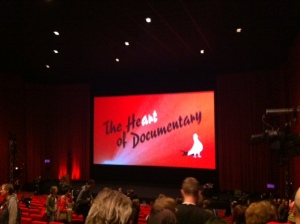Wild at Heart: DokLeipzig 2011
Wild at Heart – An Experiment in Courage was an intriguing title for a novel industry event hosted by DokLeipzig this year. The intention with this invite-only event was to inject new life into industry conversations, which as festival events go, often end up in panels where we exchange information, but less frequently meaningful conversations of what actually underpins our passion for documentary, and reasons for doing what we’re doing.
The morning consisted of three rounds of 30mins, spread over 10 tables of 8, with a table host each, and three questions designed to get deeper into the heart of courage within documentary. We were told to write on the table cloths. Ilo von Seckendorff, one of the organisers, told me that it took a long time to find the right questions for this event. There were no right or wrong answers expected of us (although it was easy to fall into that mode of thinking), and participants were supposed to drop their roles as commissioners, producers, filmmakers etc and just be present as a person, contributing from the heart.
And here are the questions we debated:
 1. Which are, for you, the most courageous decisions made in the documentary world?
1. Which are, for you, the most courageous decisions made in the documentary world?
People talked about history and contemporary courageous pioneers, in documentary as well as in technology; and noted emotional vs physical courage – by either filmmaker or subject.
2. What does it take to be courageous?
My next table, led by Sean Farnel, drew up a long list of qualities needed for courage: passion, trust, freedom, vision, etc and discussed the relationships between them in order to determine what sequence or hierarchy of qualities allowed us to be courageous.
By the third table, it was supposed to get more personal:
3. Imagine a really courageous decision related to your own job. What difference would it make?
On my table, a big debate resulted in some people questioning whether it was permissible to call what we do courageous – aren’t we just doing our jobs? Others debated risk vs courage, and the line between courage and vanity.
Some people struggled with the word courage itself, and some, of course, didn’t care too much for submitting themselves to this entire process; which now makes me think about the difficulty of experiencing “change”. It’s not always easy to just let it unfold.
After three table conversations, we gathered all the “take aways” in a summary session led by the table hosts, and with comments by the floor.
What I found powerful throughout was the open dialogue it created and the realisation how similar the discussions and concerns were in the different groups. It was also a new way to network horizontally, as people simply connected as people via the actual debate, which was also designed to connect people to their values.
The elephant emerging?
We were told to look out for the “elephant emerging” from our discussions.
For Rudy Buttignol, who eloquently spoke at the end in his role of roving table host, it was “accountability:” how can we as a group become more transparent and look after ever diminishing resources more carefully.
For me the elephant in the room, somehow, was #occupy, the first global day (15 October 2011) had just taken place two days earlier. This movement is throwing the socio-political debate wide open right now, especially by notcoming to the “party” with preconceived ideas, by questioning methods and systems, by being “open” and insisting on consensus.
As Douglas Rushkoff says in an article on CNN: “…this is not a movement with a traditional narrative arc. As the product of the decentralized networked-era culture, it is less about victory than sustainability. It is not about one-pointedness, but inclusion and groping toward consensus. It is not like a book; it is like the Internet.”
For a moment in this room, we too, were equals; realising that an “us vs them” structure is unhelpful and has a psychological consequence: It changes behaviour.
We are the 99%.
I’m excited to see where this kind of conversation will take us. We need it – to cope with all the change.
Do you like this page?
